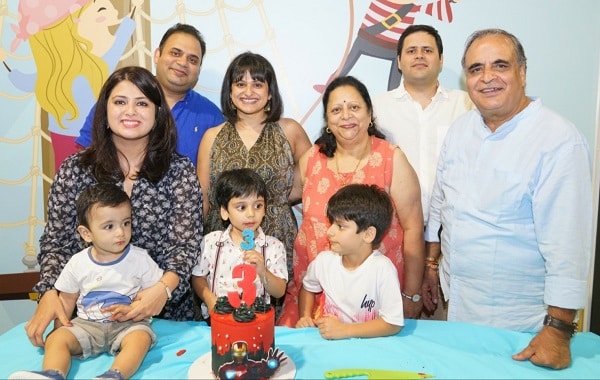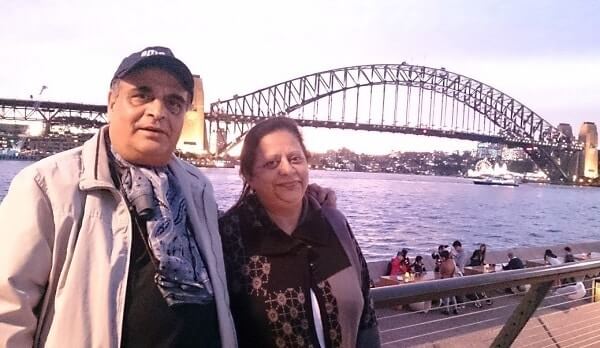“26 January is coming up, memsaab,” the milkman I had known for years said to me. “Maybe you should put up a black flag on your balcony.”
“I d-don’t have a black flag,” I stammered in reply.
“Use a black sari, or a dupatta.”
It was the final straw.
That night 31 years ago, under cover of darkness, I fled my home in Kashmir with my husband and two young sons, after months of sheer terror.
This is my recount of experiences I had then. As I relay these to you, I make no allegations or accusations. This is but a straightforward account of the days leading up to the night we were driven out of our state.
* * *
It was the night of 19 Jan 1990.
My brother and his family were visiting us. They were over to see our new house – which we had built lovingly, putting all our savings in.
The doorbell rang at 11.30 pm.
It was our Pandit neighbours, all in a panic. Don’t you know what’s happening?
Locked in from the cold winter, we hadn’t heard the commotion. The entire neighbourhood was out on the streets, as loudspeakers from the mosque blared out messages telling Kashmiri Pandits like us, to leave, convert to Islam, or die.
* * *
The terror had begun months ago, when we received letters telling us to leave Kashmir, referred to as the Land of Allah, the land for Muslims, in which kaafirs (non-believers) had no place. The letters ended with threats to our children’s lives.
We were a small minority group of Kashmiri Pandits, in the Muslim majority state of Jammu and Kashmir. The daily persecutions and harassment of our community of the past few months had left us in fear of our lives.
There were daily reports of killings, blackouts, curfew, stone-throwing, break-ins, and closure of schools, colleges, and cinema halls.
Only recently, a young girl had been raped and killed brutally. She worked as a nurse, and apparently had informed police about a patient or patients, clearly militants. They left her body, cut up into pieces, at a prominent city crossing.
Not so long ago, a close friend, Mr. Lassa Kaul, who happened to be my husband’s boss, Director Doordarshan Kendra, Srinagar was shot on point blank range outside his residence in Bemina colony under the watchful eyes of his driver.
Also, our close relation, Mr. Pushker Nath Handoo, who was a top state Government officer in the information department lost his life under the watchful eyes of his ‘trusted’ driver at his home in Karan Nagar, Srinagar.
There are many more such cases of friends and family members who are no longer with us.
And tonight, the mosque was sending out its chilling message on its loudspeakers: Kashmiri Pandits exit, but leave your women behind. Bataw varaie, Batneiw saan.
‘‘You’re the only home here with a phone connection’’, the Pandit neighbours beseeched us. So we rang the police, the army. No one picked up.
We rang friends in other localities, family in neighbouring cities: Send help. Our hearts came up to our mouths when we heard they were in the same boat as us, with mosques in their areas blaring out the same messages.
Arise Muslim brothers, fight the Hindus.
Nizaam-e-mustafa.
Pakistan zindabad.
At 1.00am, the calls continued in the background as mayhem continued on the street.
My brother said, “I’m going to hide up on the terrace and keep a lookout. I’ll yell when I see them coming, you all run out the back.”
I figured I could ask our Muslim neighbours for help – they had been strangely silent.
From our backyard, I hoisted my 8-year-old son into my Pandit neighbour’s house to wake them up. Meanwhile, as a mob descended on our doorstep, imagine my terror when I realised, my son is stuck in the neighbour’s backyard, all alone, in the dark…
It was only later we would get to know, the mob was there to threaten us.
But we knew then that we had to run, if we wanted to save our lives. But where would we go? And how? We had no money at home, and very little in the bank, having put all of our savings towards the dream home we would have to leave.
It was dead of winter, and the city was closed to curfew.
On the morning of the 20th, things were quiet. The night, too, passed sleeplessly, in sheer terror.
“Make sure when we leave, that you take Baby Brother with us. You might forget him if he is sleeping,” my son whispered to me.
* * *
On 21 Jan, another neighbour stopped me in the street.
“Sister, can I send the women of my family to yours tonight? The army-wallahs won’t search your home because you’re Hindu. They create havoc in Muslim homes like ours.”
I stared at him dumb-founded as he continued, “Leave your house unlocked tonight. I might have to bring my family over in a hurry.”
* * *
On 25th Jan, the doorbell rang. I froze.
I told my husband to go to the back of the house. We had been advised that the callers might show more restraint to women.
Two young men stood at the door, tall and well-built. Their hands were hidden in the pockets of their flowing phirans.
“Is your husband home?” they asked.
“No,” I lied. “He’s probably still at work.”
“He’s not,” they replied. “We checked. He works at Doordarshan, in the news department. We wanted to ask why he spreads lies about us.”
“He doesn’t make the news,” I replied, trying to calm my racing heart. “He just puts out what comes from above.”
Silence. Then: “May we use your phone?”
I unplugged the instrument from inside the house and brought it out, hooking it into an outside port. As I stood around, their phone conversation sent the chills right down my spine.
“Hope the army is not creating hassles in your area,” they said into the phone. “It’s all clear over here. Maybe send the asla (ammunition) here. This is a large house. There’s plenty of space here to store it all.”
I can’t spend the night in this house, I said to my husband.
We rang a friend in the army cantonment area, considered fully safe, and said we were coming over to stay with them for the night.
The next morning, 26 Jan, we returned home, just as the milkman came by. He gave us our daily milk – and that missive about the black flag.
* * *
We hatched a plan to leave home that day.
Taxi to Jammu? We didn’t want to risk it. We would have to fly.
There is a flight early tomorrow, the airport told us, but it is fully booked. We replied in desperation, we’re coming regardless.
We arranged to borrow some cash from our close friend, Deepak Budki. As night fell, under the cover of darkness, my husband drove to Deepak’s house to pick it up.
Meanwhile at home, I had packed a bag. It was a briefcase, really – all it contained was our documents. The kids and I put on as many clothes as we could; to protect us from the cold I told them, but I knew this is all we would have for the next few weeks.
As a taxi drove us to the airport, I did not once turn around to look at the dream home we were leaving behind.
Our eyes kept darting around to spot people who might stop us. It was when we saw the army picket at the entrance to the airport, that we breathed again.
“I know the flight is full,” my husband told the check-in counter. “But there could be some cancellations as curfew has set in now?”
Wait and see, we were told.
I prayed all night as we huddled in the cold – but relative safety – of the airport hall.
Early next morning, we were airborne.
At Jammu, we got some time to process the last four days. I had left food on the stove. Clothes drying on the stand. Toys lying around the house…
Soon we began to hear from friends. Some, like Deepak, had fled like us. Others, tragically, will live on in the Valley eternally.
* * *

Weeks later, we found ourselves in Jalandhar, my husband’s employer Doordarshan having found him a suitable position. We were warned not to tell anyone we were from Kashmir, as landlords were not renting to Kashmiris – you see, they may have fled their homes, and in all likelihood would have no money for rent.
“Just the one bag?” our new landlord asked us.
“Our stuff is coming by truck,” we lied.
My own employer, DAV, also found me a position as a teacher. I was an MA-MEd, but I happily took on nursery teacher training. My son, who went to an elite private school in Kashmir, went to Central School now.
Like all Kashmiri Pandits, we fell back on our education to build us up again. We’ve always been proud of the 100% literacy in our community: it came in very handy in this time of crisis.
My husband and I climbed the corporate ladder with better and better jobs. Our sons took engineering and MBA degrees, and found jobs in Australia. Upon retiring, we moved to Australia permanently in 2009 to be with them.
On 19 Jan this year, the anniversary of that dreadful start to the Kashmiri exodus, we spent the day with online communities now stretched across the world, who faced that terror. We remembered. We prayed. We thanked, even.
But most of all, we voiced our hope. Our wounds remain raw, but justice eludes us even after 32 years. Driven out of our ancestral lands, we continue to seek a probe into the genocide of 1989-90.
As told to Rajni Anand Luthra
READ ALSO: Our tryst with destiny: A Kashmiri Pandit perspective





